
17 Apr Powering H-Town: Generator Installation by Houston Electricians
Houston, Texas—home to barbecue, space ships, cowboy boots, and some seriously wild weather. (Seriously, if you haven’t experienced a Houston thunderstorm, you’re missing out on nature’s light show.)
But along with those awe-inspiring storms comes the not-so-fun part: power outages. Yep, when those thunderheads roll in or a hurricane decides to swing by for a visit, you can bet your bottom dollar that the power might take a hike. And nobody wants to be left in the dark, quite literally.
That’s where backup power can really save the day. Enter home generator installation by Houston electricians. These folks aren’t just your average sparky—they’re true electrical professionals, making sure that when Mother Nature throws a tantrum, you’re not left twiddling your thumbs in the dark.
Whether you’re chilling in your home or running a business, having a reliable backup power source isn’t a luxury anymore. It’s a downright necessity. Now let’s take a look at why having a home generator installed by a professional is about as essential as sunscreen in July—and how you can go about getting your own.
The Need for Generators in Houston
In recent years, Houston has been through the wringer when it comes to power outages, and it’s not just a minor inconvenience—it’s a full-blown headache.
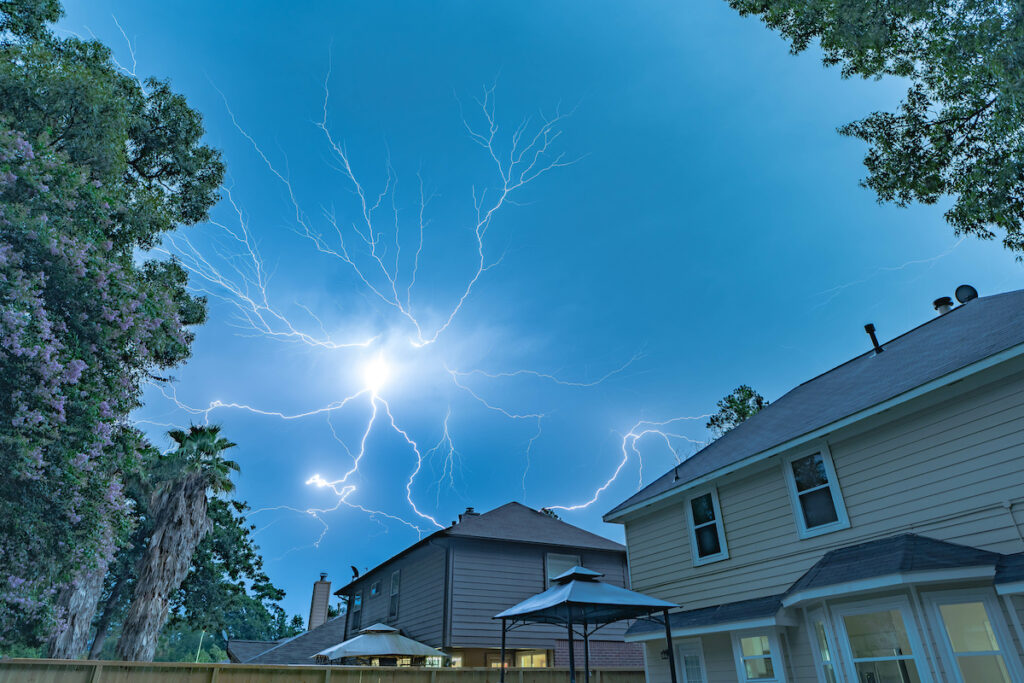
And Houston isn’t exactly a stranger to extreme weather. We’re talking hurricanes that can make even the toughest Texan shake in their boots and thunderstorms that rattle windows like a drummer on steroids.
Now, picture this: you’re chilling at home after a long day of work, maybe catching up on your favorite TV show or whipping up a culinary masterpiece in the kitchen. Suddenly, zap—the power goes out. No warning, no heads-up, just darkness. And it’s not just your home that’s plunged into blackout mode. It’s the whole darn neighborhood.
But it’s not just about missing out on your Netflix binge or having to finish dinner by candlelight (although, let’s be real, that’s annoying enough). These outages can have serious consequences.
We’re talking about essential stuff here—like keeping the lights on in hospitals so doctors can do their thing, or making sure emergency services can respond when you need them most.
And let’s not forget about businesses. Imagine running a restaurant and having your fridge full of perishables go kaput during a power outage. That’s not just a loss of food; it’s a loss of income, jobs, and maybe even your reputation.
With storms in Houston getting more intense and more frequent, having a backup power solution isn’t just a luxury—it’s a lifeline. And that’s where generators come in.
Whole Home/Standby Generators
How They Work
Generators, in essence, are machines designed to convert mechanical energy into electrical energy. They serve as dependable sources of power, especially in situations where the primary electrical supply is unavailable or fails.
These devices come in various types to suit different needs, from portable options ideal for residential settings to more substantial standby generators that work better for commercial properties.
Generators operate based on the principles of electromagnetic induction, a process discovered by Michael Faraday in the 1830s. Here’s how they typically function:
- Energy Conversion: The core function of any generator is to convert mechanical energy into electrical energy. This mechanical energy can originate from various sources, including gasoline, diesel, natural gas, or propane engines. In some instances, turbines driven by wind, water, or steam can also serve as the mechanical source.
- Induction Process: Inside a generator, an engine powers a rotating component known as the rotor or armature. This rotation occurs within a magnetic field created by either permanent magnets or electromagnets in a part of the generator called the stator. As the rotor spins, it cuts through the magnetic lines of force in the stator. According to Faraday’s law of electromagnetic induction, this movement through a magnetic field induces an electrical current in the surrounding conductive coils.
- Electric Current Output: The electricity generated is typically in the form of alternating current (AC), akin to the power received from utility companies. The generator includes components that regulate the voltage to suitable levels for home or business use.
Features of Whole Home/Standby Generators
Standby generators differ from portable generators primarily in their permanence and capacity. Here are some distinguishing features:
- Automatic Operation: Standby generators are equipped with a transfer switch that senses a power loss within seconds and automatically switches to generator power. A seamless transition is critical for safety and convenience.
For example, when a hurricane hits and the power grid goes down, the transfer switch on a standby generator can detect the outage instantly. It automatically activates the generator, restoring power within seconds. This capability is crucial for maintaining safety and convenience, especially during prolonged blackouts that can last for days.
- Fuel Source: Unlike portable generators, which typically run on gasoline, standby generators often use natural gas or propane, tapping directly into existing utility lines. This provides a long-term, uninterrupted power supply without the need for frequent refueling.
- Power Capacity: Standby generators are designed to handle a higher load, capable of powering an entire home or commercial building. This includes the operation of high-demand appliances and systems such as air conditioners, heaters, and security systems.
Houston’s sweltering summers have air conditioning systems running around the clock, placing a high demand on power systems. Standby generators are built to handle such loads, ensuring that essential services like cooling systems, refrigeration, and medical equipment continue to operate without interruption. This capacity is critical for both residential comfort and the safety of perishable goods and medications during outages.
- Noise Level and Emissions: Manufacturers have optimized these generators to operate more quietly and efficiently, minimizing noise and reducing emissions compared to their portable counterparts.
- Durability and Weather Resistance: Houston’s weather can be harsh, with conditions ranging from intense heat to flooding rains. Standby generators are designed to withstand these extremes. They are housed in durable enclosures that protect them from the elements, ensuring they remain operational when needed most.
Choosing a Generator
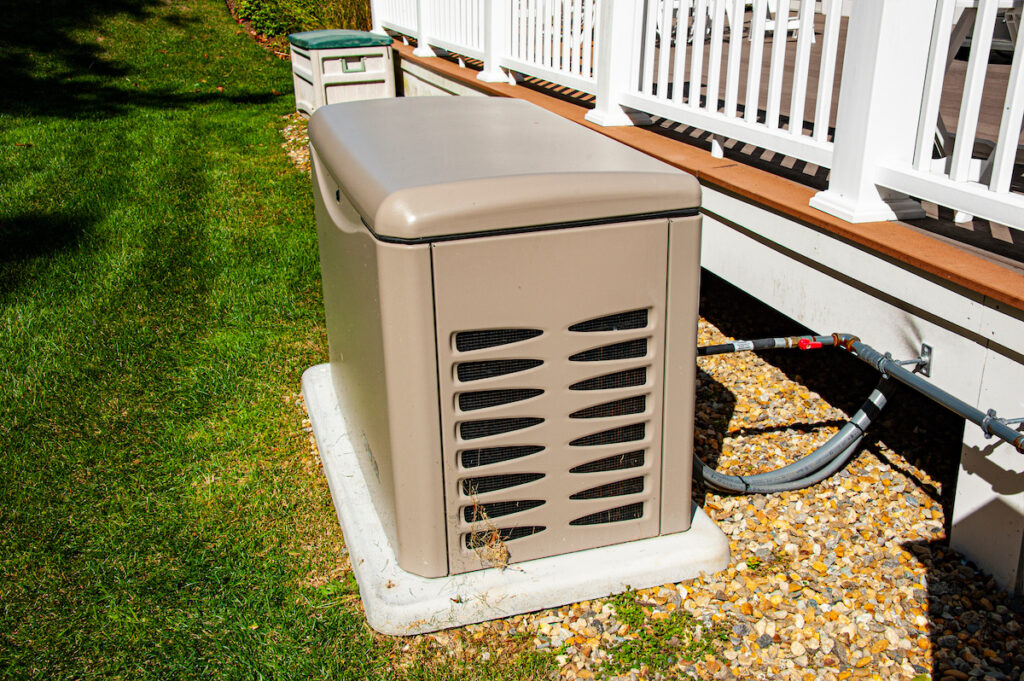
When you’re picking out a standby generator for your home or business, there are several things you need to think about:
- First and foremost is the generator size (power capacity), which dictates how much electrical output the generator can provide. This aspect is pivotal as it ensures the generator can meet the electricity demands of the intended applications.
- Another important consideration is the fuel type utilized by the generator. Different generators operate on various fuels, such as gasoline, diesel, natural gas, or propane. The choice of fuel type depends on factors like availability, cost, and convenience. Additionally, the fuel source can influence the generator’s performance and efficiency.
- The intended use of the generator. Whether it’s for emergency backup power during outages, powering essential appliances and electronics while camping, or providing electricity to an entire building, the intended application shapes the generator selection process.
Houston electricians can provide invaluable assistance in selecting the right generator for various needs by leveraging their expertise in electrical systems and equipment. Here are some of the ways they can help with generator installation:
- Assessment of Power Capacity: Electricians can assess the power requirements of a property or facility to determine the appropriate generator capacity needed. They have the technical knowledge to calculate the wattage requirements based on the electrical loads of appliances, equipment, and systems that need power during an outage.
- Recommendation of Suitable Fuel Type: Based on factors like availability, cost, and safety, electricians can recommend the most suitable fuel type for the generator. They can advise whether gasoline, diesel, natural gas, or propane is the optimal choice for the specific situation, taking into account factors like fuel storage requirements and maintenance considerations.
- Evaluation of Intended Use: Electricians can discuss with clients their specific needs and intended use for the generator. Whether it’s for residential backup power, commercial applications, or outdoor events, electricians can provide guidance on selecting a generator that meets the requirements of the intended use case.
- Installation and Wiring: Once the generator is selected, electricians can handle the installation process, ensuring that it is properly connected to the electrical system of the property. This includes wiring the generator to the main electrical panel, installing transfer switches or interlock kits for safe operation, and configuring the system to seamlessly switch between utility power and generator power during outages.
- Maintenance and Servicing: Electricians can also provide ongoing maintenance and servicing for the generator to ensure its reliable operation over time. This includes tasks such as regular inspections, testing, fuel system maintenance, and troubleshooting any issues that may arise.
Houston Generator Installation
Benefits for Local Homeowners & Business Owners

Generator installation offers a range of benefits that extend far beyond mere convenience, particularly in a city like Houston where prolonged power outages are not uncommon:
- Continuity of Essential Functions: During power outages that can persist for days, having a generator ensures the continuity of essential functions. This includes keeping the lights on, powering critical appliances, and maintaining comfortable indoor temperatures regardless of external conditions. This uninterrupted power supply is especially crucial for businesses, healthcare facilities, and households with medical equipment that rely on consistent electricity.
- Preservation of Perishable Goods: With a generator in place, there’s no need to worry about perishable goods spoiling during extended power outages. Refrigerators and freezers can continue operating, preserving food and other perishables, which can translate to significant cost savings by avoiding losses due to spoilage.
- Peace of Mind: Knowing that a generator is ready to kick in during emergencies provides peace of mind to homeowners and business owners alike. Instead of being at the mercy of unpredictable power outages, they can rest assured that essential functions will continue to operate smoothly, reducing stress and anxiety during challenging times.
- Minimized Disruption: Power outages can disrupt daily life and business operations, causing inconvenience and potentially leading to financial losses. Generator installation minimizes this disruption by ensuring that critical functions can continue uninterrupted, allowing businesses to stay operational and households to maintain a sense of normalcy even in adverse conditions.
- Cost Savings: While the initial investment in generator installation may seem significant, the cost savings associated with avoiding downtime and potential damage to equipment make it a wise long-term investment. Businesses can prevent revenue losses resulting from interrupted operations, while homeowners can avoid expenses related to repairing or replacing damaged appliances and electronics due to power surges or outages.
In essence, generator installation offers a comprehensive solution to mitigate the impacts of power outages, providing both practical and financial benefits that make it a worthwhile investment for homeowners and businesses alike.
The Installation Process
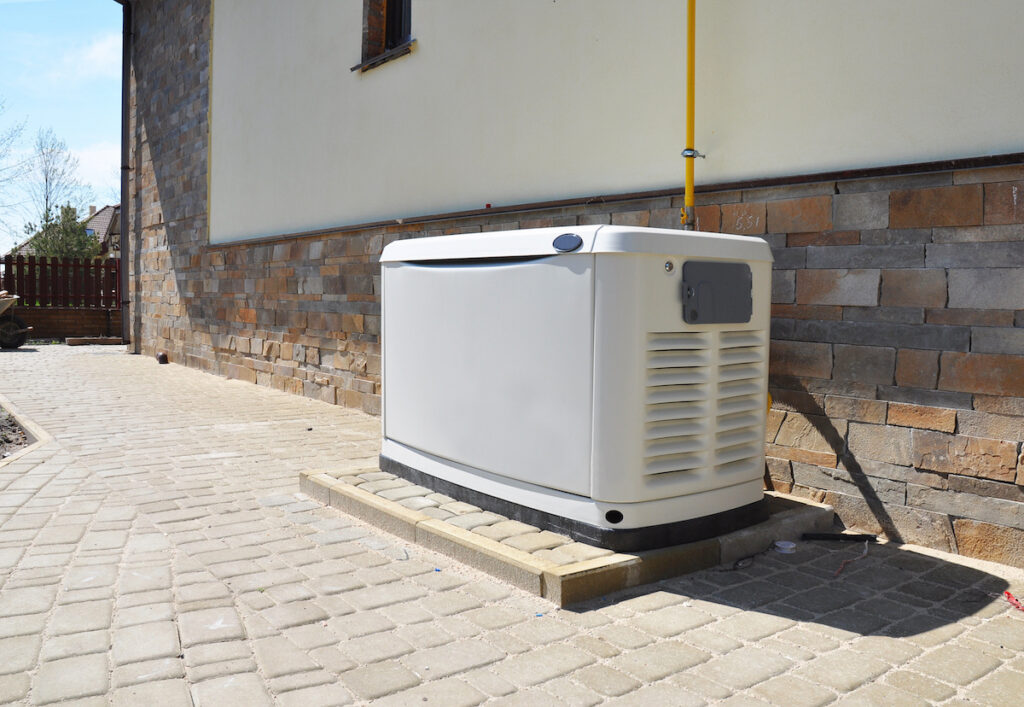
Installing a generator requires careful planning and execution. It begins with an assessment of the property’s power needs, followed by selecting the appropriate generator size and type.
Obtaining the necessary permits and ensuring compliance with local regulations and codes are integral steps in the process. Once these prerequisites are met, the installation itself involves site preparation, wiring, and connection to the electrical system.
Maintenance and Safety
Maintenance and safety play pivotal roles in ensuring the dependable performance and longevity of generators, safeguarding both property and occupants. Let’s go over these aspects in greater detail:
- Maintenance for Reliable Operation: Regular maintenance is the cornerstone of keeping generators in optimal condition. This entails a proactive approach that includes periodic inspections, testing, and servicing by qualified professionals. During these maintenance checks, technicians meticulously examine various components of the generator, including the engine, fuel system, electrical connections, and control panels, to detect any signs of wear, damage, or malfunction. By identifying and addressing potential issues in their nascent stages, maintenance helps prevent costly breakdowns and ensures the uninterrupted functionality of the generator when it’s needed most.
- Safety Precautions during Operation: Observing safety precautions is paramount whenever operating generators to mitigate the risk of accidents and safeguard the well-being of occupants. Key safety measures include:
- Adequate Ventilation: Generators emit exhaust gases, including carbon monoxide, which can be lethal if inhaled in high concentrations. Therefore, it’s essential to operate generators in well-ventilated areas to prevent the buildup of toxic fumes. Avoid placing generators in enclosed or poorly ventilated spaces, such as basements or garages, and ensure there’s ample airflow to dissipate exhaust gases safely.
- Carbon Monoxide Monitoring: Installing carbon monoxide detectors in proximity to the generator and inside living or working areas is imperative to provide early warnings of potential carbon monoxide buildup. Regularly test and maintain these detectors to ensure they’re functioning correctly and replace batteries as needed.
- Proper Fuel Storage: Storing fuel for generators requires adherence to safety guidelines to minimize the risk of fire or fuel spills. Use approved containers designed for fuel storage, store them in well-ventilated areas away from ignition sources, and follow proper fuel handling procedures to prevent accidents and environmental contamination.
Choosing the Right Houston Electrician to Install Your Generator
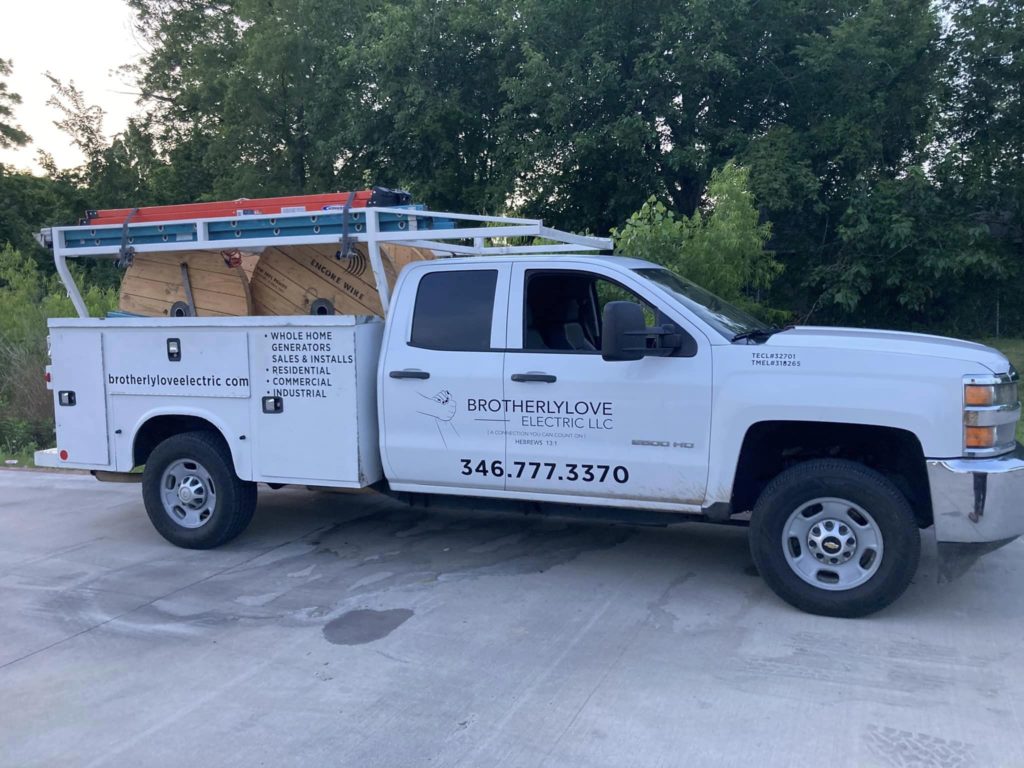
Having a reliable backup power source is crucial, and that’s where a properly installed generator comes in. But ensuring its smooth operation starts with selecting the right electrician.
Here are some things to look for:
- Qualifications: Always choose licensed and insured electricians with experience specifically in generator installations and servicing.
- Research and Reviews: Read online reviews and ask friends or neighbors for recommendations.
- Clear Communication: Discuss your needs and expectations with potential electricians. A good one will answer your questions thoroughly and explain the installation process clearly.
Peace of Mind with a Backup Power System
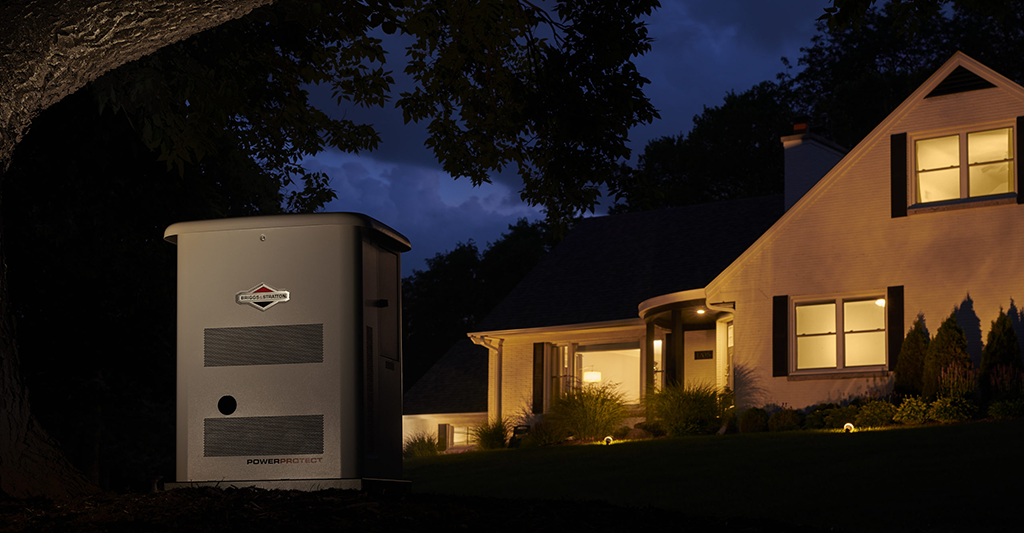
Generators provide a reliable source of electricity during outages, keeping your home or business operational. Having a trusted local electrician by your side can also ensure that the installation meets safety standards, as well as your specific requirements.
Remember:
- Size and Type: Let the electrician know your power needs to determine the ideal generator size and type.
- Permits: Electrical work often requires permits. The electrician should be knowledgeable about the permitting process in your area.
- Written Agreement: Get a written contract outlining the project details, materials list, timeline, and final cost.
By following these steps, you can find a qualified electrician to install your generator, giving you peace of mind and the power to weather any outage.

